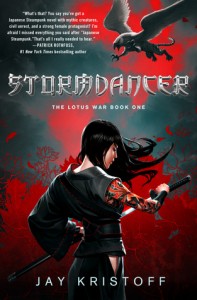 Stormdancer by Jay Kristoff (The Lotus War #1)
Stormdancer by Jay Kristoff (The Lotus War #1)
Genre: Dystopian, Steampunk
Publisher: Thomas Dunne Books on September 18, 2012
Source: Purchased
The Shima Imperium verges on the brink of environmental collapse; an island nation once rich in tradition and myth, now decimated by clockwork industrialization and the machine-worshipers of the Lotus Guild.View Spoiler »
I’m just going to say this here and now: if you judge Stormdancer on the merit of the first hundred pages, this would be a 2 star review, not a 4 star one. That first section of the novel is basically a giant info dump, introducing a ton of characters, recounting many stories of Shima’s gods and goddesses, and telling the legends of the famed thunder tigers. All of this information is necessary to the story, but I still feel that it could’ve been executed a lot better.
As often as she’s heard the stories, Yukiko doesn’t believe in things like gods or demons, and she certainly doesn’t believe in thunder tigers! Well, imagine her surprise when she meets Buruu, the last thunder tiger in Shima. As if that weren’t enough to bowl Yukiko right over, she quickly realizes that she and Buruu can communicate telepathically. They start off at odds but cannot resist the pull of their bond; while a thunder tiger like Buruu will never be tamed, he does come to love Yukiko. The connection between Yukiko and Buruu had a tangible effect on both of them: as Yukiko became increasingly driven by instinct and quick to anger, Buruu in turn became more intelligent and began understanding subtle human reactions. Their friendship was far and away the best part of Stormdancer.
Chi is a type of fuel made from the blood lotus, a species of plant whose mass production has taken over the entire agricultural economy. Farmers who once grew crops are being forced to grow lotus under penalty of death. Subsistence farming has essentially ceased, and the empire now relies on their colonies to supply food for the entire country.
But good news! The country’s population is dwindling thanks to the environmental effects of burning chi fuel. Skies are red from lotus pollution, toxic rain falls from the skies, and climate change is rampant. Guess we won’t have to worry about feeding those pesky peasants for much longer. But wait…what will we do when there aren’t people to work the lotus fields?!
These are the questions that young Yukiko has after being exposed to the darker aspects of the Shogunate. It isn’t hard to see the parallels between the burning of chi fuel in Stormdancer and the results of decades worth of burning fossil fuels. Kristoff is clearly an environmentalist, and I can’t say that I found fault with it. Is his message a subtle one? No. But it’s effective in its straightforwardness: if we continue to abuse the Earth, there will be serious long term consequences potentially worthy of a dystopian society.
There are some complicated family dynamics at work here, to say the least. Yukiko’s mother is absent from her life, which she’s been led to believe was a result of her father’s infidelity. So it’s not exactly surprising that Yukiko and her aunt are at odds; she is having an affair with her sister’s husband and Yukiko’s father, after all. But Yukiko eventually learns that nothing is that simple, and realizes how blind she’s been to the suffering of others. When Yukiko realizes just how much the Shogunate and the zealots of the Lotus Guild have taken from her family her fury is incredible.
It is this personal and political awakening that made Stormdancer such an enjoyable reading experience for me. Is there anything better than a flawed character realizing how blind she’s been and finally taking back her power? Actually, there is. A flawed character taking back her power with the help of her BFF, who happens to be a mythical beast of legend. The two friends plan to right the wrongs done to the people of Shima and restore the country’s original majesty.
As much as I liked Stormdancer, I have to admit that Kristoff’s prose veers towards purple a bit too often for my tastes. There were a few times when his extended metaphors and similes became slightly ridiculous and detracted from my enjoyment a bit. I love descriptive writing as much as the next girl, but it’s a little embarrassing when you can’t even be sure what the writer is even saying for the sheer number of superlatives.
Despite my gripes, I really liked Stormdancer, and would recommend it to anyone who likes steampunk and Asian-influenced SFF, and those who have the patience to slog through the first section. Here’s hoping that Kristoff’s pacing has improved, because I have high hopes for the sequel!